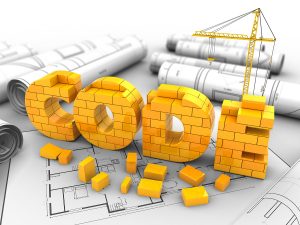
Buildings research at the University of Central Florida (UCF) possesses a wide range of analytical services capabilities that have been built and refined over the last quarter century. Capabilities range from development of sophisticated numerical models for heat, mass and contaminant transport, validation and benchmark, and analysis of complex phenomena in buildings and energy systems. Additional capabilities include software, application and web services development on an individual and enterprise-wide basis and developing customized building energy simulation models. Particular specialization includes analytical services in building and air quality issues.
Software Development Capabilities
 UCF researchers can create software for servers, personal devices or web applications.
UCF researchers can create software for servers, personal devices or web applications.
- Full cycle application development
- Database design and implementation.
- Web applications
- Web services such as Energy Calculators
Model Development Capabilities
Models serve a useful purpose in overall research and development. Modeling used in conjunction with experiments is a cost-effective means of achieving results. It facilitates:
- Creating automatic standard reference building creation for codes, ratings and advanced efficiency programs for utilities and governments
- Understanding influences of several simultaneous effects – provides interrelationships
- Prediction for initial design or redesign
- Building energy system optimization
- Prioritization of parameters that are to be examined experimentally
- Examination of what-if scenarios to determine relative influences of parametric variations
- Applying experimental results to other geographic locations
- Applying experimental results to other building types
- Simplified modeling techniques identified through detailed analysis
Building Simulation Development Tools
UCF writes code for internal building simulation programs and for enhancing publically available models. The mainstay of UCF’s model development capabilities rests with the computational tool, FSEC 3.0. FSEC 3.0 is designed to allow the user to easily incorporate additional user-specific models. FSEC 3.0 was developed by UCF’s Florida Solar Energy Center (FSEC) and is a general building simulation program, which provides detailed simulation of a whole building system, including energy, moisture, multi-zone airflows, air distribution systems and cooling and heating equipment simultaneously. UCF has used this tool to conduct analysis of:
- Heat, moisture and contaminant balance
- Heat and moisture transfer in the building envelope
- Airflow analysis using CFD
- Multi-zone airflow, including air distribution system
- Zone and air distribution system pressures
- HVAC system models
- Air distribution system heat and moisture exchange
- Radon transport in soil and slab
- Flow in porous media
Model Enhancement Capabilities
 Expertise in user-specific development and enhancement of third party models such as DOE 2.1E and EnergyPlus. UCF has decades of whole building energy simulation program development and has been part of the Department of Energy’s (DOE) EnergyPlus core development team since 2001. UCF also improves existing modeling tools (e.g., DOE2.1 or EnergyPlus) for government, manufacturers, or other stakeholders.
Expertise in user-specific development and enhancement of third party models such as DOE 2.1E and EnergyPlus. UCF has decades of whole building energy simulation program development and has been part of the Department of Energy’s (DOE) EnergyPlus core development team since 2001. UCF also improves existing modeling tools (e.g., DOE2.1 or EnergyPlus) for government, manufacturers, or other stakeholders.
Analysis Capabilities
- Prediction of heat, moisture and contaminant flows in buildings
- Radiant barrier system analysis
- Air distribution system analysis
- Modeling efficacy of radon mitigation strategies
- Analysis of innovative building and systems concepts
- System integration and mechanical systems analyses
- Whole-building or detailed component analysis
- Thermal and moisture storage systems
- HVAC system control and optimization
- Building energy model automatic calibration and optimization
- Developing custom-made EnergyPlus models for new and emerging HVAC technologies
- Conduct numerical experiments using EnergyPlus whole building simulation program
- Modeling phase change materials as part of building envelope
Development of Codes and Standards
- Creating automatic standard reference building for codes, ratings and advanced efficiency programs for utilities and governments
- Developing multipliers for simplified code calculations through detailed analysis
- Evaluating impacts of energy codes using building energy models
- Implementing of national codes and standards at regional level
- Statistical and Experimental Data Analysis
- Linear and non-linear statistical and regression analysis
- Analysis of collected or monitored experimental data
- Benchmark analysis from experimental data
- Experimental data collection planning, mapping, archiving and reporting
- Analysis of buildings performance data sets using statistical programs
UCF’s experimental research uses in-house developed data collection and analysis tools.
